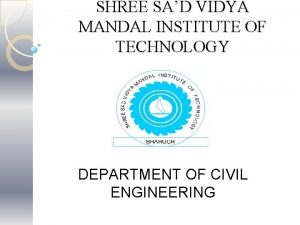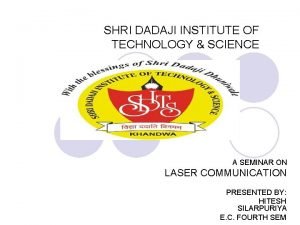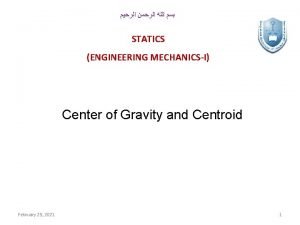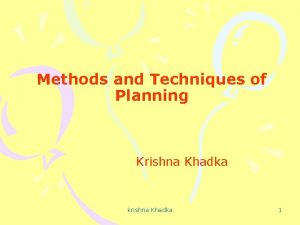Welcome to Shri Krishna Education Centre Shri Krishna


























- Slides: 26

Welcome to Shri Krishna Education Centre Shri Krishna Education visit us at www. accountsshikshak. com 1

MEANING OF ACCOUNTING Accounting is recording financial transactions, summarizing them and communicating the financial information to users, i. e. , the proprietors, creditors, investors, government agencies, employees, etc. It is because of these characteristics that accounting is called the language of business. ‘’Accounting is the art of recording, classifying and summarizing in a significant manner and in terms of money; transactions and events which are, in part at least, of a financial character, the interpreting the result thereof. ’’ By Committee on Terminology of American Institute of certified Public Accountant. Shri Krishna Education visit us at www. accountsshikshak. com 2

Definitions: ‘’Accounting is the science of recording and classifying business transactions and events, primarily of a financial character, and the art of making significant summaries, analysis and interpretations of those transactions and events and communicating the results to persons who must make decisions or form judgment. ’’ ‘’Accounting is the process of identifying, measuring and communicating economic information to permit informed judgments and decisions by users of the information. ’’ Shri Krishna Education visit us at www. accountsshikshak. com 3

ACCOUNTING PROCESS Based on the main attributes of accounting, we may list the steps of accounting process as follows: 1. Financial Transactions, 2. Recording, 3. Classifying, 4. Summarizing, 5. Analyzing and Interpreting and 6. Communicating. We have discussed the above steps in detail. We may now explain the accounting process with the help of a diagram: Shri Krishna Education visit us at www. accountsshikshak. com 4

Accounting Process Communicating to the Users Analysis and interpretation Summarizing Trail Balance Trading & P/L a/c Balance Sheet Financial Transactions of Events Journal 1. Cash Book 2. Purchases Book 3. Sales Book 4. Purchases Return Book 5. Sales Return Book 6. Bills Payable Book 7. Bills Receivable Book 8. Journal Proper Recording Classifying (Posting into Ledger) Shri Krishna Education visit us at www. accountsshikshak. com 5

BRANCHES OF ACCOUNTING The changing business scenario through centuries has given rise to specialized branches of accounting which could cater to the changing requirements. These branches are: Shri Krishna Education visit us at www. accountsshikshak. com 6

Branches of Accounting Financial Accounting Cost Accounting Management Accounting Shri Krishna Education visit us at www. accountsshikshak. com 7

FINANCIAL ACCOUNTING Financial Accounting is that branch of accounting, which records financial transactions and events, summarizes and interprets them and communicates the results to the users. It ascertains profit earned or loss incurred during an accounting period (usually a year) and the financial position on the date when the accounting period ends. The endproduct of Financial Accounting is the Profit and Loss Account for period ended (which shows the profit earned or loss incurred) and the Balance Sheet as on the last day of the accounting period (which shows the financial position). Shri Krishna Education visit us at www. accountsshikshak. com 8

COST ACCOUNTING The limitation of Financial Accounting in respect of information relating to the cost of products or services led to the development of a specialized branch, i. e. , Cost Accounting. It ascertains the cost of products manufactured or services rendered and helps the management in decision-making (say price fixation) and exercising controls. Shri Krishna Education visit us at www. accountsshikshak. com 9

MANAGEMEMT ACCOUNTING Management Accounting is the most recently developed branch of accounting. It is concerned with generating accounting information relating to funds, costs, profits, etc; as it enables the management in decisionmaking. We may say that Management Accounting addresses the needs of a single user group, i. e. the management. Shri Krishna Education visit us at www. accountsshikshak. com 10

Sub fields of Accounting : Social Responsibility Accounting: As the social awareness about the undesirable by-product of economic activity increases, the social responsibility accounting also increases. It concerned with accounting for social cost incurred by the enterprise & social benefits created. Example Sahara group case Human Resource Accounting: Human resource accounting deals with identify, quantify & measuring the data related to human resource in an organization that are not accounted for conventional accounting practice. It is an act of identify, measuring & evaluating the worth of human resource in a systematic manner to the organization & society as a whole. 11

Difference Between BOOK KEEPING, ACCOUNTING BASIS BOOK KEEPING & ACCOUNTING 1. Scope Book keeping is concerned with identifying financial transactions; measuring them in money terms; recording them in the books of accounts and classifying them. Accounting is concerned with summarizing the recorded transactions, interpreting them and communicating the results. 2. Stage Book keeping is a primary stage. Accounting is a secondary stage. It begins where Book Keeping ends. 3. Objective The objective of Book Keeping is to maintain systematic records of financial transactions. The objective of accounting is to ascertain net results of operations and financial position and to communicate information to the 12 interested parties.

4. Nature of job This job is routine in nature. This job is analytical and dynamic in nature. 5. Performance Junior staff performs this function. Senior staff performs this function. 6. Special Skills Book Keeping is mechanical in nature and thus, does not require special skills. Accounting requires special skills and ability to analyses and interpret Shri Krishna Education visit us at www. accountsshikshak. com 13

OBJECTIES OF ACCOUNTING The objective or functions of accounting are: 1. Maintaining Systematic Records of Transactions: The objective of accounting is to record financial transactions and events of the organization in the books of account in a systematic manner, classifying the recorded data under appropriate accounts and summarizing them into financial statements, i. e. Income Statement and Position Statement. 2. Ascertaining Profit or Loss: Another objective of accounting is to ascertain the net result of day-to-day transaction for a period in other words, to ascertain whether during the accounting period, the firm earned a profit or incurred a loss. For this purpose, a statement called an Income Statement or the Trading and Profit and Loss Account is prepared. In this account, the revenues resulting from the transactions of the accounting period and the expenses incurred are recorded. A comparison of the two shows whether the business earned a profit or incurred a loss. Shri Krishna Education visit us at www. accountsshikshak. com 14

3. Ascertaining Financial Position: For a businessman, it is not adequate to only ascertain the profit or loss; it is also necessary to know the financial position of the organization. For this purpose, a statement of assets, liabilities and the owner’s capital is prepared. Such a statement is called a Balance Sheet. 4. Assisting the Management: The management often requires financial information for decision-making, effective control, budgeting and forecasting. Accounting provides financial information to assist the management in discharging this function. 5. Communicating Accounting Information to Users: Another objective of accounting is to provide accounting information to users who analyze them as per their individual requirements. 6. Prevention of Frauds: Maintaining regular and systematic accounting records helps in preventing possible frauds. 15

ADVANTAGE OF ACCOUNTING 1. Financial Information about Business: Financial performance during the accounting period, i. e. profit or loss and also the financial position at the end of the accounting period is known through accounting. 2. Assistance to Management: The management makes business plans, takes decisions and exercise control over affairs on the basis of accounting information. Shri Krishna Education visit us at www. accountsshikshak. com 16

3. Replaces Memory: A systematic and timely recording of transactions obviates the necessity to remember the transactions. The accounting record provides the necessary information. 4. Facilitates Settlement of Tax Liabilities: A systematic accounting record immensely helps settlement of income tax, sales tax, VAT and excise duty liabilities since it is a good evidence of the correctness of transactions. Shri Krishna Education visit us at www. accountsshikshak. com 17

5. Evidence in Court: Systematic record of transactions is often accepted by the Courts as good evidence. 6. Assistance in the Event of Insolvency: Insolvency proceeding involve explaining many transactions that have taken place in the past. Systematic accounting records assist a great deal in such a situation. Shri Krishna Education visit us at www. accountsshikshak. com 18

LIMITATIONS OF ACCOUNTING 1. Accounting is not Fully Exact: Although most of the transactions are recorded on the basis of evidence such as sale or purchase or receipt of cash, yet some estimates are also made for ascertaining profit or loss. Examples of this are providing depreciation on the basis of estimated useful life of an asset, possible bad debts, the probable market price of the stock of goods, etc. People in all probability will have different estimates. This will also lead to a different amount of profit or loss being shown by different persons. Thus, the profit cannot be treated as exact. Shri Krishna Education visit us at www. accountsshikshak. com 19

2. Accounting does not Indicate the Realizable Value: The Balance Sheet does not show the amount of cash which the firm may realize by the sale of all the assets. This is because many assets are not meant to sold; they are meant for use and are shown at cost less depreciation that may have been written off. 3. Accounting Ignores the Qualitative Elements: Since accounting is confined to monetary matters only, qualitative elements like quality of staff, industrial relations and public relations are ignored. Shri Krishna Education visit us at www. accountsshikshak. com 20

4. Accounting Ignores the Effect of Price Level Changes: Accounting statements are prepared at historical cost. Money, as a measurement unit, changes in value. It does not remain stable. Unless price level changes are considered while preparing financial statements, accounting information will not show true financial results. 5. Accounting may lead to Window Dressing: The term window dressing means manipulation of accounts in a way so as to conceal vital facts and present the financial statements in a way to show better position than what it is actually. In this situation, income statement (i. e. Profit and Loss Account) fails to provide a true and fair view of the result of operations and the Balance Sheet fails to provide a true and fair view of the financial position of the enterprise. Shri Krishna Education visit us at www. accountsshikshak. com 21

Internal Users 1. Owners: Owners contribute capital in the business and thus are exposed to maximum risk; naturally, they are interesting in knowing the profit earned or loss suffered by their business besides the safety of their capital. The financial statements give the information about profit or loss and financial position of the business. 2. Management: The management makes extensive use of accounting information to arrive at informed decisions such as determination of selling price, cost controls and reduction, investment into new projects, etc. Shri Krishna Education visit us at www. accountsshikshak. com 22

3. Employees and Workers: Employees and workers are entitled to bonus at the year end, which is linked to the profit earned by an enterprise. Therefore, the employees and workers are interested in financial statements. Besides, the financial statements also reflect whether the enterprise has deposited its dues into the provident fund and employees’ state insurance, etc. , or not. Shri Krishna Education visit us at www. accountsshikshak. com 23

EXTERNAL USERS 1. Banks and Financial Institutions: Banks and financial institutions are an essential part of any business as they provide loans to the business. Naturally, they watch the performance of the business to know, whether it is making progress as projected ensure the safety and recovery of the loan advanced. They assess it by analyzing the accounting information. 2. Investors and Potential Investors: Investment involves risk and also the investors do not have direct control over the business affairs. Therefore, they rely on the accounting information available to them and seek answers to the questions such as ---- what is the earning capacity of the enterprise and how safe is their investment? 24

3. Creditors: Creditors are those parties who supply goods or services on credit. It is a common business practice that a large amount of suppliers’ remains invested in credit sales. Before granting credit, creditors satisfy themselves about the creditworthiness of the business. The financial statements help them immensely in making such an assessment. 4. Government and its Authorities: The government makes use of financial statement to compile national income accounts and other information. The information available to it enables them to take policy decisions. Government levies varied taxes such as Excise Duty, VAT, Service Tax and Income Tax. These government authorities assess the correct tax dues from an analysis of financial statements. Shri Krishna Education visit us at www. accountsshikshak. com 25

Prepared by: Ashwini Sharma Phone No. 9999383078 Under guidance of Mr. Ajay Chopra Phone No. 9810123857 Shri Krishna Education visit us at www. accountsshikshak. com 26
 Krishna education centre
Krishna education centre Krishna education centre
Krishna education centre Sold goods to krishna
Sold goods to krishna Sndp movement year
Sndp movement year Shri sad
Shri sad Shri dadaji institute of technology and science
Shri dadaji institute of technology and science Shri bhairavdev vidyalaya
Shri bhairavdev vidyalaya Shri ambika vidyalaya kedgaon
Shri ambika vidyalaya kedgaon Heddy shri ahimsa putra
Heddy shri ahimsa putra Centroid in engineering mechanics
Centroid in engineering mechanics Center of gravity for different shapes
Center of gravity for different shapes Geneva welcome center
Geneva welcome center Wise men three clever are we
Wise men three clever are we Plas gwynant outdoor education centre
Plas gwynant outdoor education centre Frank chapman
Frank chapman Burwardsley school trip
Burwardsley school trip Australian nursing and midwifery education centre
Australian nursing and midwifery education centre Art and technology education centre
Art and technology education centre Riverton education support centre
Riverton education support centre High ashurst cabins
High ashurst cabins Frank chapman outdoor education centre
Frank chapman outdoor education centre Finecc
Finecc Lancashire outdoor education
Lancashire outdoor education Center of gravity in physical education
Center of gravity in physical education Wednesday lunch
Wednesday lunch Athlone education centre
Athlone education centre Fox howl
Fox howl















































